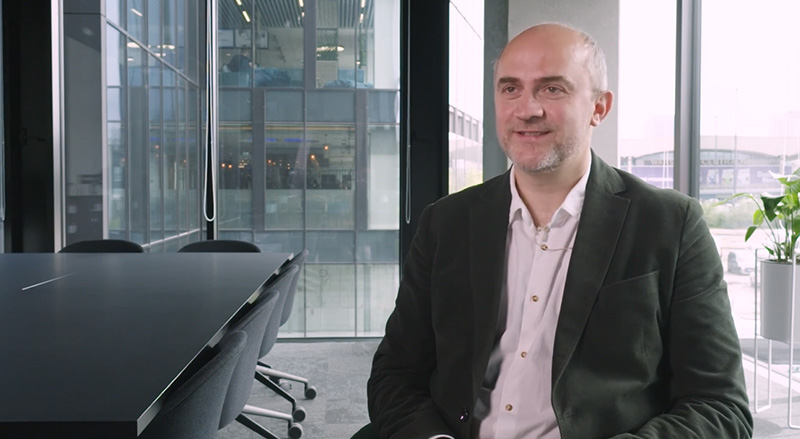The recent Technology of Tomorrow Conference in Warsaw was a pivotal event to showcase new use cases for blockchain in Europe. Dr Sebastian Grabowski, a technical lead for Orange Business Services, held a presentation on ‘How devices are getting smarter with EML (Embedded Machine Learning) – a practical combination of IoT and AI’.
In an insightful conversation with Dr. Grabowski, we further explored the topics of IoT, the multifaceted impact of blockchain on industries and the challenges it faces in gaining widespread adoption.
Expertise in digital transformation
Grabowski is a lead architect for Orange Business in the field of Industrial 4.0 and Industrial Internet of Things (IoT). The organisation deals with a wide range of services, including connectivity, security, and intelligence services, particularly tailored to industries and cities.
His role within the team revolves around smart industry consulting in Europe. His team’s mission is twofold: to innovate services for European industries and to advise clients on their digital transformation journey.
As industries stand at a crossroads, deciding between digital transformation and potentially losing revenue, Sebastian and his team play a pivotal role in guiding them toward a more sustainable and efficient future.
Blockchain’s role in telecommunications
Sebastian acknowledges that blockchain technology is still an undiscovered and misunderstood area for many. However, he emphasises that blockchain extends far beyond cryptocurrency. In the realm of telecommunications, blockchain offers a unique set of advantages, primarily related to security, trust, and transaction monitoring.
With the proliferation of IoT devices, the unparalleled security and transparency of blockchain can be leveraged to ensure the integrity of data and transactions.
Moreover, blockchain can serve as a means of recognizing and securing devices in cities, overcoming the challenge of diverse communication protocols. Sebastian also highlights the potential of Non-Fungible Tokens (NFTs) as digital keys, capable of unlocking a multitude of secure applications and services.
Challenges to blockchain adoption
One of the biggest hurdles facing the widespread adoption of blockchain technology is the prevalent misconception that it is solely about cryptocurrencies. Sebastian acknowledges the negative association with cryptocurrencies due to scams and fraudulent activities. To overcome this perception, he advocates for education and evangelization within the industry.
Blockchain education can help individuals and organisations understand the diverse use cases and benefits that blockchain technology can offer. Governments and public entities also have a role to play by promoting responsible blockchain use through regulations and guidelines.
Blockchain and smart cities
When considering smart city projects, Sebastian points out two crucial qualities that blockchain must possess to deliver value. Firstly, latency, or speed, is of paramount importance. Blockchain must be capable of near-instantaneous transaction verification and execution, especially when it comes to functionalities like using blockchain as a digital car key.
Secondly, in alignment with the industry’s sustainability goals, blockchain protocols must evolve towards more environmentally friendly options, a key concern for the automotive sector.
BSV blockchain scales sustainably for smart cities
The BSV blockchain is renowned for its high scalability and capacity for processing transactions near-instantaneous. It has a track record of handling large volumes of transactions per second (TPS), far exceeding other blockchain networks.
At the moment the main net handles a maximum throughput of about 10,000 transactions per second. This maximum throughput is expected to grow to much higher capabilities, which makes the BSV blockchain the ideal solution for applications in smart cities.
In alignment with sustainability goals, the BSV blockchain offers a more environmentally friendly approach compared to other proof-of-work (PoW) blockchain networks. While BSV employs a scalable, high-efficiency approach to blockchain validation. This design significantly reduces the carbon footprint associated with blockchain operations, aligning with concerns about sustainability.
